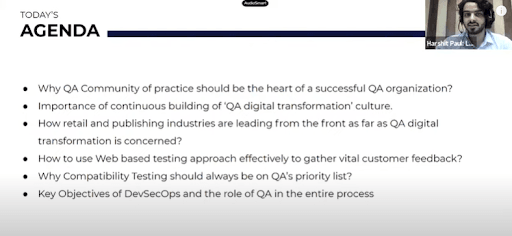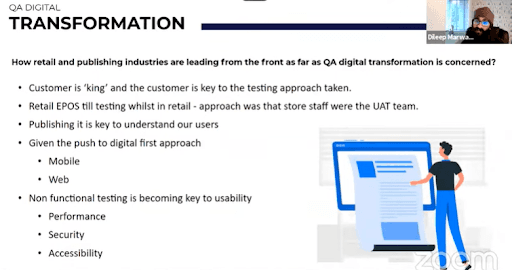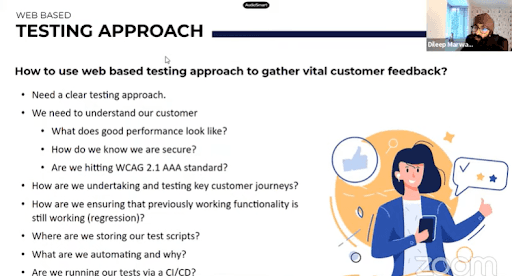How Digital Transformation Is Catalyzing Changes In Automation Testing
Salman Khan
Posted On: August 27, 2021
![]() 15885 Views
15885 Views
![]() 10 Min Read
10 Min Read
The digital transformation trend provides organizations with some of the most significant opportunities that can help them stay competitive in today’s dynamically changing market. Though it is hard to define the word “digital transformation,” we can mainly describe it as adopting digital technology into critical business functions of the organization.
Digital transformation is transforming the way businesses work, bringing changes to every functional aspect of the organization, thereby aiding in the faster product delivery cycles. QA (Quality Assurance) digital transformation and QA Community of Practice (CoP) have now emerged as critical key change-makers for digital-first organizations.
As the demand for speedy delivery and customer expectations grows, it is more crucial than ever to ship quality products and solutions quickly. Over the last few years, automation testing has played a significant role in facilitating digital transformation and fulfilling the demands and challenges of customer expectations. As software products are anticipated to dominate the global market, testing is being conducted from a broader perspective. The reason for this transition is the growing importance of providing an ultimate customer experience. QA is majorly built on the pillars of automation testing, continuous testing, and shift left testing.
LambdaTest hosted a webinar in association with The Economist to explore how digital transformation is acting as a catalyst in bringing changes to the field of automation testing.
In case you missed the webinar, let’s look at the major highlights of this event.
TABLE OF CONTENT
- About The Webinar
- Why QA Community Of Practice Should Be The Heart Of A Successful QA Organization?
- Importance Of Continuous Building Of QA Digital Transformation Culture
- Use Web-Based Testing Approach To Gain Vital Customer Feedbacks
- Why Perform Browser Compatibility Testing?
- Key Objectives Of DevSecOps And The Role Of QA Engineer
If you’re new to Selenium and wondering what it is then we recommend checking out our guide – What is Selenium? If you’re looking to improve your Automation Testing interview skills, check out our curated list of Automation Testing interview questions and answers.
About The Webinar
To realize the potential of digital transformation in the field of test automation, LambdaTest hosted a webinar in association with The Economist. Dileep Marway – Head of Quality and Enablement (Engineering & Security) teamed up with Harshit Paul – Product & Growth Manager at LambdaTest to explore why the QA Community of Practice (CoP) is at the heart of a successful QA organization.
Dileep from The Economist is a proven expert in diverse fields like delivery of complex and scalable technology systems, test/QA management, and DevSecOps. Dileep has minutely observed the transformation in the QA field over this career spanning more than 15+ years. The Economist is one of the selected few international publications that has witnessed the era of traditional publishing as well as online publishing! It’s like coming full circle for The Economist. Dileep has worked in retail and publishing – fields that are at the cusp of a major digital transformation.
Before exploring the essential aspects of the webinar, let’s take a look at the webinar agenda:

Why Should a QA Community Of Practice Be The Heart Of A Successful QA Organization?
Dileep started the webinar by deep-diving into the essence of the QA Community of Practice (CoP). According to Dileep, when you move to a new role, the foremost thing you need to do is build a community where people with a shared purpose & interest can brainstorm ideas. Basically, CoP is built on the same guidelines! CoP helps in improving domain knowledge, facilitating learning, and stimulating creativity.
Here are the further pointers emphasized by Dileep:
Highlights Of Community of Practice (CoP)
Here are some of the skills that the QA driving the CoP should possess:
- There should be interest in a common domain since it helps in enhancing the skills of the participants. Domains can be anything like test automation, performance testing tools, accessibility monitoring in the Continuous Integration/Continuous Deployment (CI/CD), or incorporating TestCafe with a cloud-based Selenium Grid.
- Shared knowledge and interaction should be one of the center points of the CoP. Different people must spearhead the meetings to get diverse opinions (inputs).
- The focus should be on Doing, not on Talking!

Principles For Building Community of Practice (CoP)
Dileep further explains the principle and tips for building an effective CoP:
- First & foremost, CoP must be independent of the organization’s QA structure. QA is everyone’s responsibility, whether the person is from people from marketing, sales, delivery, or management. Your ultimate goal should be to take everyone on the journey and seek valuable inputs & feedback from them.
- Discussions in CoP must be centered around diverse topics like performance testing, accessibility testing, penetration testing, etc. The assignment must be a part of the agile process, topics of which should be discussed in the CoP.
- Membership must be voluntary. Forcing people to join sessions would only hurt the core fundamentals of the community.
- Span the boundaries (i.e., cross functions, geographical locations, etc.) so that you get maximum meaningful participation in the community.
- Kick start with a broader scope and spin-off into smaller ones.
Watch this video to learn how Cypress can be used to automate accessibility testing.
Tips For Successful Community of Practice (CoP)
Here are some of the tips that Dileep mentioned for building a CoP:
- Implement right culture and behavior
- Devise a strong mission statement to get maximum participation
- Ensure that visibility and transparency is there at every level
- Set the organization’s values like quality-first approach, gratitude, trustworthiness, etc.

Read: Best Practices in Selenium Automation
Essence Of Building a Culture of QA Digital Transformation
Dileep emphasized the significance of building a culture that focuses on the continuous transformation of QA practice. He stressed an important point, ‘QA is everyone’s job,’ and it is important to leverage tools that help you with test automation.
Quality should never be limited to manual testing, so don’t shy away from digging into the source code! Wear the developer’s hat even when you are playing the role of a QA engineer!

Non-functional testing is the primary cornerstone for improving the end-user experience, and digital-first is the only approach for enterprises to stay relevant in this hyper-competitive business environment.

Using Web-Based Testing Approach To Gain Vital Customer Feedbacks
Dileep explains that web-based testing is the most effective way to obtain vital customer inputs. However, before testing, we must first define our testing strategy. For instance, what and why we need to test. Essentially, everyone in the team should have access to the testing strategy to understand how the product is being tested.
A documentation for testing the product should be in place and regularly updated so that a team leader can ask the team about the testing approach and also about when and why it was changed.
Here are a few of the questions that one should keep in mind to understand the customer journey:
- What does good performance look like?
- Are we secure?
- Are we hitting the standards (WCAG 2.1 AAA) that we imply?
- How are we undertaking and testing key customer journeys?
- Are we performing regression testing?
- Where are we storing our test automation scripts?
- What are we automating, and why are we automating?
- Are we incorporating a CI/CD pipeline to run our test suites?

Why Perform Browser Compatibility Testing?
Dileep further drills down into the importance of performing browser compatibility testing. As everyone knows, there are a plethora of browsers and devices available in the market, and it will keep rising exponentially. So it becomes a tedious task for a tester or a QA professional to cover all the available browsers and devices while maintaining an in-house device lab.

Dileep emphasized some of the key pointers before devising a browser compatibility testing approach.
- Understand your customer base.
- Use the different web analytics tools to figure out which browser’s operating system or devices are getting you the majority of your web traffic.
- Look into service incidents and customer service complaints.
Read: Cross Browser Testing Strategy Explained in Three Easy Steps
You can refer to the below video tutorial on how to perform real-time browser testing on LambdaTest.
Once you have devised a browser compatibility testing approach, you have two options. You can either manually purchase devices that can be expensive and hard to maintain or choose cloud-based cross browser testing tools.
According to Dileep – his personal favorite tool is LambdaTest.

With LambdaTest, you can perform manual and automated cross browser testing across 2000+ browser and OS combinations at a faster pace. You get to test on the latest devices without any hassle of maintaining physical device labs. Also, you can automate your test suites with the best CI/CD tools available to integrate with LambdaTest.
Key Objectives Of DevSecOps And The Role Of QA Engineer
Dileep explains the key objectives of the DevSecOps, where he emphasized the importance of security mechanisms. The key aspect around DevSecOps is ensuring that there is the right culture, as – Culture is at the heart of QA formation in the team.

Here are the key objectives of the DevSecOps mentioned by Dileep.
- Keep pace with the increasing demands and agile process.
- Faster time to market in lead time.
- Improved deployment frequency.
- Better team culture.
- Increased collaboration across the team.
Read: Automating Testing: A Backbone To DevOps
After delving deeper into the digital transformation and QA Community of Practice (CoP), Harshit introduced the LambdaTest platform and its top-notch features. He then demonstrated how to use the LambdaTest cloud grid to do Selenium automation testing and Cypress testing at scale. Furthermore, how to use automation logs to obtain detailed test insights and resolve bugs quickly.
In the end, we had an interesting Q&A session.
That’s All!
We hope you enjoyed this insightful webinar. In case you missed it, you could find the complete recording on the LambdaTest Youtube channel. By now you must have got a good grasp of how digital transformation has revolutionized the automation testing world.
Stay updated with the latest news around the test automation world by subscribing to our weekly newsletter – Coding Jag.
Happy Testing!
Got Questions? Drop them on LambdaTest Community. Visit now















